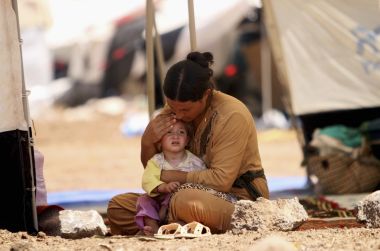Escaping ISIS: Lawyer finds way to rescue women, children held captive by jihadists

A Yazidi lawyer who used to manage small-town issues has risen to the occasion to do what has to be done: Rescue women and children held captive by the Islamic State despite the threat of a brutal death in the hands of the jihadists.
Before his village in northern Iraq was overran by the ISIS, former lawyer Khalil al-Dakhi dealt with marriage, divorce, and death, the Gospel Herald wrote.
As many as 3,000 women and children in al-Dakhi's community have been enslaved by ISIS while hundreds of Yazidi men have been massacred.
Many of the women taken were forced to marry ISIS fighters. Others were raped while some suffered brutal executions like stoning.
"But in the aftermath of this cataclysm that hit their community, he began to gather testimony, firstly of people who had suffered from the simple military attack," said Edward Watts, who directed the Frontline documentary "Escaping ISIS."
Al-Dakhi then found some type of pattern for saving ISIS captives in the testimonies of women and children who escaped the Islamist extremists.
"I have to find out where they're holding the Yazidi girls," said al-Dakhi. "We know where most of them are being held. We're even in contact with some of them. When they tell me their stories, I find it hard to believe. Sometimes I cry ... From what I've been told, four out of five of them have been raped."
"What he realised looking at this testimony was that the women were coming back with extraordinarily detailed information about the disposition of the Islamic State," Watts said. "So where there were checkpoints, where there were sort of fortified headquarters and, most importantly for him, where the Yazidi hostages were being held."
Now, al-Dakhi manages a covert network of contacts deeply embedded in ISIS territory to help families escape via a "modern-day underground railroad," wrote PBS.
But the rescue missions are not always successful. Two of his men died in an ambush by ISIS militants.
"They got a girl to call the rescue network saying her captor was away at the frontline and therefore, she was, in a sense, in a position to be rescued," Watts said of the killed men. "They sent two of their guys in. ISIS were waiting for them, captured them and executed them."
He visits refugee camps where many Yazidis now live, as almost 200,000 Yazidis have been forced to flee because of the fighting in Iraq and Syria.
The former lawyer goes on spreading word about his network and establishing a vast database of Yazidi women who have escaped from ISIS and those who are still being held captives.
So far, al-Dakhi's network has saved more than 100 people from the hands of ISIS.
Al-Dakhli hopes there would be a war crimes trial in the future.
One Yazidi girl who managed to flee ISIS did so with a stolen phone that had a video clip of ISIS fighters making crude jokes and taking part in transactions for sabia, or "sex slaves."
"Unlike most of their output, this was not intended for public consumption," Watts said. "I think it just really gives you an idea of the callous brutality with which they were treating these very young and fragile and vulnerable women and girls because for them, they were slaves, and slaves could be bought and sold and treated entirely as they pleased."











